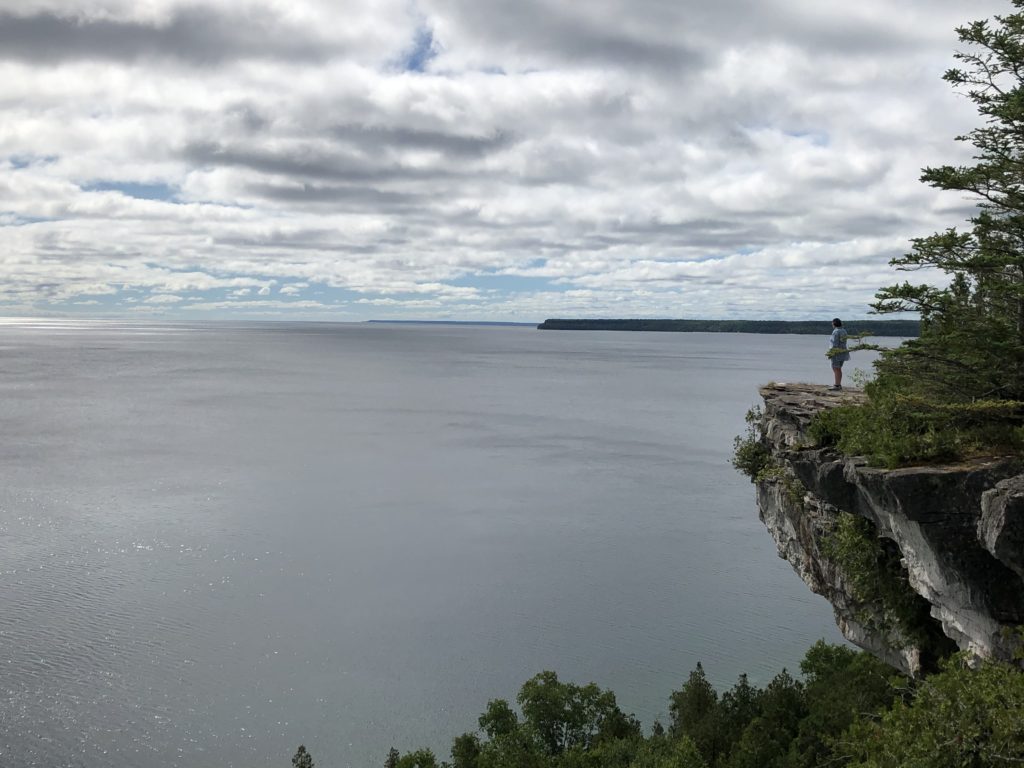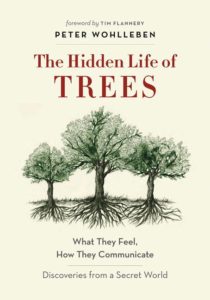This week, I wandered the Bruce Trail overlooking Georgian Bay. Cedar, pine and fir smell like home. The rock of the Canadian Shield shows the marks of millennia; fissures and crevices, some large enough to fall into, focus my mind and keep me in the present moment. Step by step, I make my way over tree roots and rock. I’m careful. I walk softly. The trail features several outcrops and we stopped at every one to take in the view. My husband took this photo of me on one ledge while he stood on another.

As I stood there, I realized I’ve been feeling like I’m on a ledge since the car accident that left me concussed. Since the pandemic started, I know that many of you are also feeling like you are out on a ledge. Believe me, I feel no satisfaction in having your company out here. I would have preferred it if you all could have stayed innocent of the sense of isolation I have come to know so intimately.
But now, you know how it feels to be unable to see your people. You’re scared. You’re wondering when or if it will ever end. Your reasons for feeling this way are different than mine, but the result is the same. Sometimes we’re lonely. We miss our old lives, our friends, our old jobs, the old way of doing things. We rebel against the new restrictions.
We miss the simple pleasures of life and when we try to replicate them, they do not measure up. We miss big things like vacations and weddings and birthday parties, but mostly we miss the little things. I used to enjoy grocery shopping and then it became a gauntlet of light and noise and chaos. I used to have a lively social life, but then that same light and noise and chaos made seeing friends and going out difficult too. There is always an undercurrent of concern, of what if. The new conditions in which we must live suck the joy from everything. Or so it seems.
Because of my brain injury, I was already so accustomed to my life being smaller that the accommodations I had to make for the pandemic did not have the same impact on me as they did on you. Like you, I suddenly had to worry about germs and hand washing and finding Lysol wipes, but the shrinking of my social and work life had already happened. I already spent way more time in my home. I already couldn’t concentrate well enough to work consistently or even read. And now, you are in a similar spot.
I have watched you go through many of the same phases as I did, particularly the “this won’t last long” phase. I have waited for you to catch up, to be where I was about four years ago when the niggling thought, “this is not going away,” took root. Now you, some of you, are coming to realize that the two or three weeks of shut down we embarked upon way back in March might not be going away soon. No matter how much we wish it would and no matter what kind of schedule we try to impose on it, what happens is not in our control. Like me, you are figuring out your new life and negotiating this new you, the you that cannot control anything. It’s an ever-changing emotional landscape.
The mental health impact of dealing with trauma is real and overwhelming. I’m not a mental health expert, but I can tell you that what you are dealing with is a big deal. You’ve got to give yourself a break. You need time. You need compassion for yourself. Please, stop beating yourself up because you can’t be like you were.
Whoever you are, whatever cracks were in your life before the pandemic are now crevices big enough to fall into. You might feel like you’re out on a ledge. Alone. And that ledge isn’t feeling too stable.
There have been dark times for me in the past four years. Strangely, one of the worst was just last week. It had nothing to do with the pandemic, but just another layer of what happened to me revealing itself. You would think I would be used to everything by now. I don’t want to go into details, because it’s not necessary to add to your trauma by sharing mine. Suffice it to say, I was out on a ledge.
I can offer you this: one thing I have learned is that I have to feel my feelings. I have to sit with them and feel them and ask them what they are teaching me. I have to befriend them and stop pushing them away. I have to be grateful for them. It seems impossible, but it is possible. When I am awake at three in the morning, heart racing, frustration rising, dark thoughts taking over, I take a deep breath and accept that this is where I am. I know something now I didn’t know before the accident. I am more than what I do or how I feel. I am more than my successes, I am more than my failures. So are you. Those plans you had were just plans.
I understand now how notions of productivity and progress replaced true joy with a twisted capitalist version of success that made self love impossible because I could never be enough. I know now that the world can fall apart around me, I can fall apart within me, pieces of me can break and strain, my brain can struggle to find words or balance or memories, but I am still me. I am fine. Even out on the ledge, I can find the place of quiet inside of me and observe. Who is this observer? It is me. The calm centre of me.
You have a calm centre of you.
When I stood on that literal ledge this week, I looked around and felt gratitude. I felt immense joy. The ledge can be a beautiful place. The wind rushed and the clouds swept by. The water below was jade green and crystal clear, becoming dark blue as it deepened. A hawk soared high above the water, but eye level with me, circling, playing on the wind. We all belong here, right here, where we are. Me, the hawk, the water, the ledge, the trees. You. There is no other place to be. You are here. You’re okay. You’re not alone.


